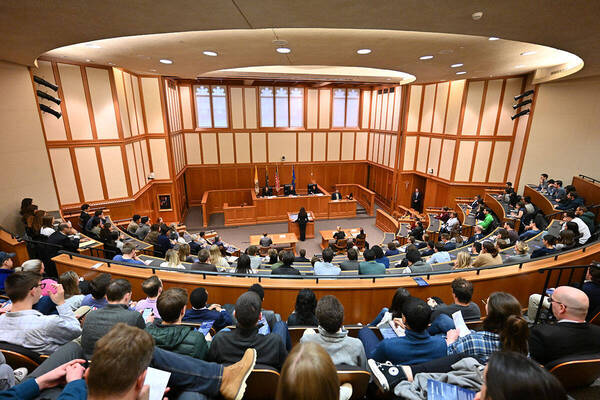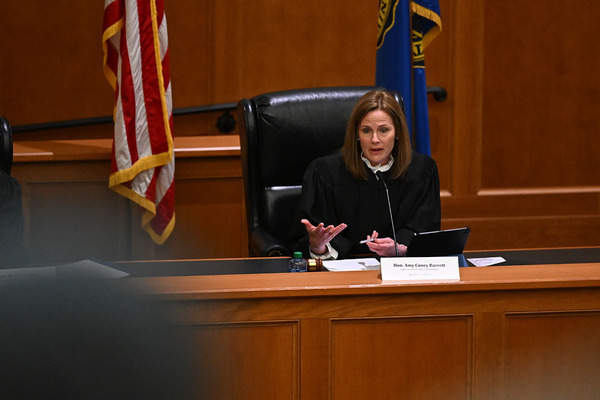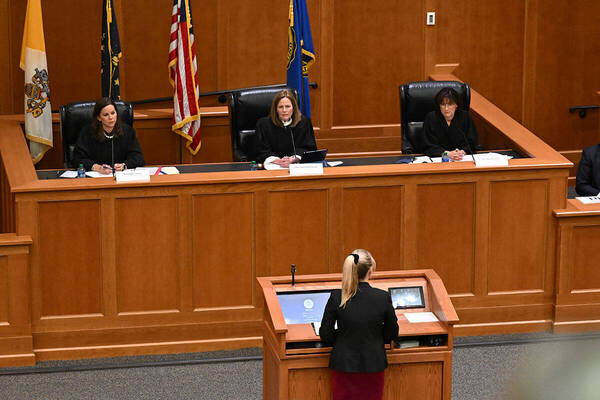Federal judges visit ND Law to hear 73rd annual Moot Court Showcase Argument

Four Notre Dame Law School students had the opportunity to argue a case in front of a panel of distinguished federal judges on Feb. 6 at the Law School’s 73rd annual Moot Court Showcase Argument.
The judges for this year’s showcase argument were Associate Justice Amy Coney Barrett of the Supreme Court of the United States, Judge Britt Grant of the U.S. Court of Appeals for the Eleventh Circuit, and Chief Judge Diane Sykes of the U.S. Court of Appeals for the Seventh Circuit.
The fictitious case chosen for the exercise, St. Agatha High School v. Vanessa Benson and the State of Hoynes, concerned a teacher at a Catholic school who was fired for creating social media posts that rejected and contradicted the school’s religious teachings. Third-year law students Olivia Rogers and Leo O’Malley advocated for the school’s position, while third-year law students Courtney Klaus and Elisabeth Crusey advocated for the teacher’s position.
The case involved issues such as whether the religion clauses prevent civil courts from adjudicating employment discrimination claims brought by an employee against her religious employer when the employee’s job description contains religious responsibilities, and whether the fictitious Hoynes Supreme Court erred in concluding that the state’s human rights act was neutral and generally applicable.
Notre Dame Law School hosts the annual Moot Court Showcase Argument for the primary purpose of providing first-year law students with an opportunity to see effective oral advocacy in action. The Law School’s McCartan Courtroom was filled to capacity with spectators on Feb. 6.
The three judges listened to the advocates and asked them questions for more than 45 minutes before concluding the argument and offering feedback to the students. Barrett quipped that the judges were “in the fortunate position of neither having to decide the case, write an opinion nor pick a winner.”

Barrett complimented Rogers, O’Malley, Klaus and Crusey on their presence and composure. She observed that the students did not rely on their notes during oral advocacy and that they were willing to embrace the implications of their arguments and where their arguments would lead. Those are marks of good oral advocates, Barrett said.
Grant added that the students did a good job of being conversational with the judges, embracing the judges’ questions and being open to what those on the bench wanted to hear about the case.
Sykes called the students “excellent oral advocates.” In addition, Sykes said she was impressed with the students’ complete command of the legal material relevant to the case.
“I am incredibly grateful to Justice Barrett, Judge Sykes and Judge Grant. Their willingness to support and encourage future generations of lawyers is an inspiration,” O’Malley said after the showcase argument. “It is hard to describe the mix of emotions I had stepping up to the podium in the McCartan Courtroom. Suffice it to say, arguing in front of such a distinguished panel is an experience that I will always remember.”
Klaus, Crusey and Rogers also said they were honored to have the opportunity to argue in front of a Supreme Court justice and two federal Court of Appeals judges.

“It’s a tremendous privilege that not many people — let alone law students — get to experience. It’s something I’m going to remember for the rest of my life,” Klaus said.
Crusey said, “Participating in this year’s showcase argument taught me valuable skills in oral advocacy, which I will carry with me throughout my career. We are deeply grateful for everybody’s time and support of Notre Dame Moot Court.”
Rogers said, “Arguing in front of such a distinguished panel of judges would be an honor and privilege at any point in my career, and even more so as a student. I really enjoyed diving into religious liberty issues to prepare for the showcase, and am so thankful to my teammates, professors and the judges for making this possible.”
The Moot Court Showcase Argument is put on each year by student members of the Notre Dame Law School Moot Court Board.
“The annual showcase argument is really a testament to amazing opportunities that Notre Dame Law School provides to its students,” O’Malley said. “I feel so blessed to have been part of this longstanding tradition and would like to thank everyone who made this year’s event possible.”
Klaus added, “I want to thank my amazing teammates who worked for months to make this happen. We all care a lot about setting a good example of appellate advocacy for the 1Ls and being a part of this awesome tradition. I couldn’t be prouder of everyone.”
Visit law.nd.edu/mootcourt to learn more about Moot Court at Notre Dame Law School.
Originally published by at law.nd.edu on Feb. 14.
Latest Colleges & Schools
- Faculty receive prestigious early career awards from National Science FoundationDuring the 2024-25 academic year, four researchers in the University of Notre Dame’s Colleges of Engineering and Science received early-career awards from the National Science Foundation.
- ‘Prebunking’ false election claims may boost trust in electionsIn recent years, democracies worldwide have seen a growing erosion of trust in election outcomes and institutions, driven in part by fears of widespread fraud. New Notre Dame research finds that “prebunking” — providing accurate information before false claims spread — boosts trust in elections more effectively than traditional fact-checking.
- Justice Amy Coney Barrett to deliver Center for Citizenship and Constitutional Government lectureAmy Coney Barrett, associate justice of the Supreme Court of the United States, will speak at the University of Notre Dame at 4 p.m. Sept. 12 in the Leighton Concert Hall of the DeBartolo Performing Arts Center.
- Three Notre Dame researchers win NEH grants for humanities-based projectsDavid Hernandez, the Eli J. and Helen Shaheen Associate Professor of Classics, and Morgan Munsen, senior research and partnerships program manager at the Nanovic Institute for European Studies in the Keough School of Global Affairs, have each won an NEH Collaborative Research grant. Thomas A. Stapleford, associate professor in the Program of Liberal Studies, is leading a team that has been awarded a Humanities Research Center on Artificial Intelligence grant.
- Open-access database offers insights into U.S. congressional candidatesEach election cycle, thousands of candidates vie for seats in the U.S. House of Representatives and the Senate. Until now, there has been no comprehensive, publicly available resource cataloging what those candidates say about who they are or what they stand for. A new open-access database called CampaignView, created by researchers at the University of Notre Dame, offers researchers, journalists and educators a powerful tool to understand congressional elections.
- First impressions count: How babies are talked about during ultrasounds impacts parent perceptions, caregiving relationshipPsychologist Kaylin Hill studied the impact of a parent’s first impression of their baby during an ultrasound exam. The words used by the medical professional to describe the baby (positive or negative) influence how the parents perceive their baby, relate to them after they're born and even how that child behaves as a toddler. The research has broad implications for how we train medical professionals to interact with expectant parents, as well as how we care for parents during the perinatal period when they are most susceptible to depression.













